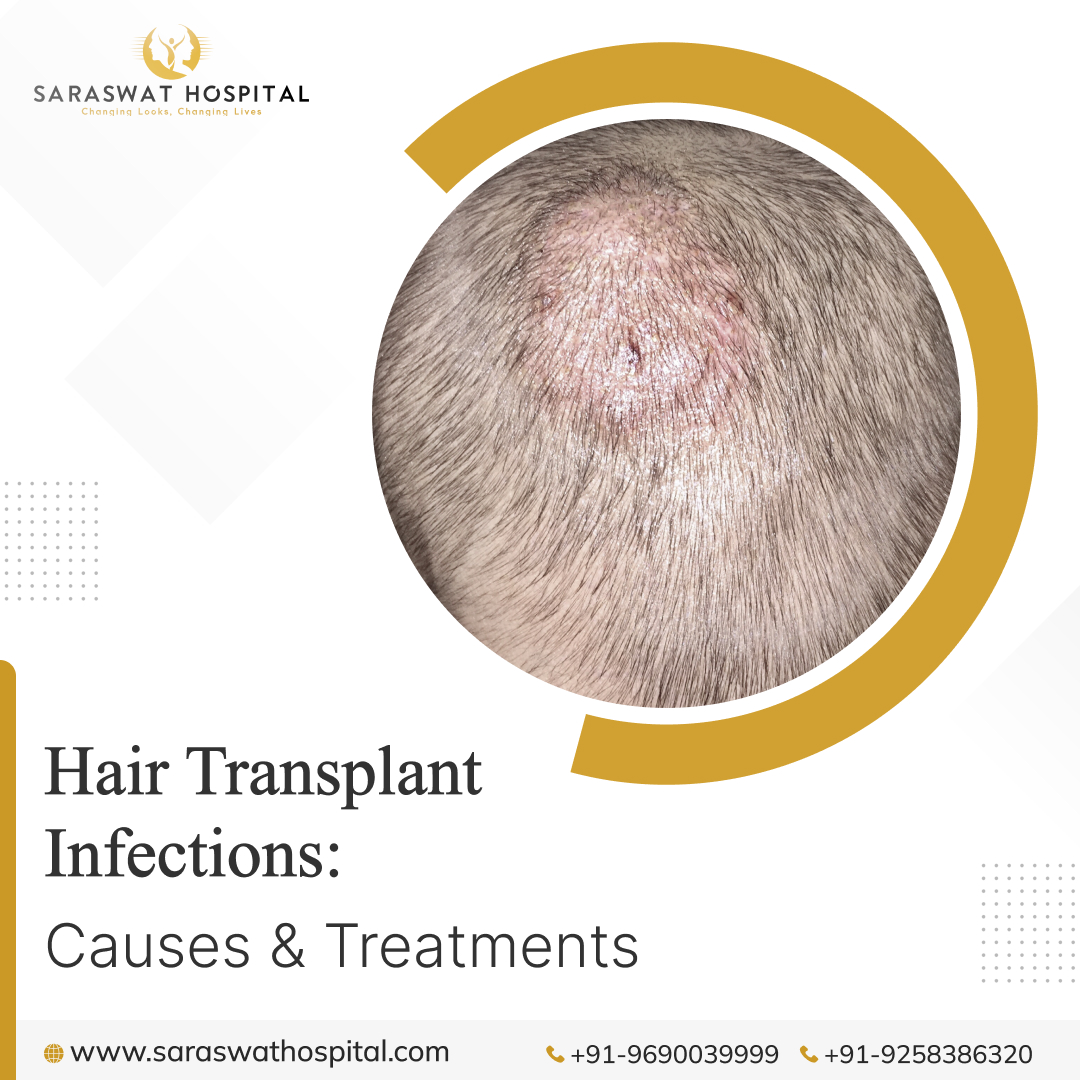Hair transplants are a simple and painless procedure to restore your natural hairline and get permanent coverage to a thinning scalp and baldness. A study concluded that every 13th man opts to have a hair transplant surgery. If you too are suffering from advanced hair thinning or baldness problems, then visit the best hair transplant clinic in India at Saraswat Hospital in Agra. Get treated by ABHRS-certified hair restoration experts and enjoy the positive outcome of natural-looking and flawless hair transplant results.
What Is Hair Transplant Procedure?
A hair transplant is a cosmetic surgery done to restore one’s natural hairline. During the surgery, hair is taken out from one part of the scalp to cover the balding areas. The patient is administered local anaesthesia to numb the scalp region. Hair follicles are extracted from the donor part of the scalp and implanted into the recipient part of the scalp.
For implantation of the hair grafts, the surgeon creates tiny channels on the recipient site. Each graft is inserted inside these channels to complete the transplant procedure. The usual recovery period for a hair transplant surgery in India is between 3-5 days. The patient must follow certain restrictions, as guided by the doctor.
What are the Chances of a Hair Transplant Infection?
The chances of a hair transplant infection are absolutely minimal. Less than one percent of patients face a post-procedure infection from a hair transplant. It is a rare occurrence and not at all common.
The risk factors for a hair transplant infection are:
-
Poor hygiene and unsanitary surgical condition
Medical guidelines insist that all surgical procedures must be performed in a clean and sterile environment. This means ensuring the surgical room contains zero bacteria. Unfortunately, this cannot be the case for a hair transplant surgery. Even the best hair transplant clinic in India cannot give you a sterile environment because hair always contains some bacteria.
Since a hair transplant surgeon is operating on hair and dealing with hair grafts, the absence of bacteria cannot be guaranteed. So, to ensure a safe procedure, the medical team must maintain a clean and hygienic surgical environment. The equipment and surgical tools should be properly sanitized. The surgeon and the rest of the team should be wearing clean disinfected gloves and medical gowns. Unsanitary conditions could lead to higher chances of contracting an infection post-procedure.
To know about the safety protocols followed at Saraswat Hospital, check out this video.
-
Excessive crust formation
Crusting and scabbing are a part of the natural healing process. As the wounds heal, crusts will appear on the operated areas of the scalp. Usually, they disappear 5 to 10 days after the scabs have formed.
But excessive crust formation can lead to higher levels of itchiness, which can be difficult to control. If a patient touches the scabs, germs and bacteria can get potentially transferred from one’s fingers to the wounds. This could lead to hair transplant infections.
-
Pre-existing medical conditions
Some patients may have underlying medical factors which could make them more vulnerable to getting infected. For example, people with diabetes are at a higher risk of getting post-procedure infections.
To prevent this, it is very important for the patient to undergo multiple medical examinations to rule out any risk factors. A person with pre-existing medical conditions like diabetes, hypertension, HIV, or cancer is at a higher risk of contracting infections. Make sure you visit the best hair transplant clinic in India where each patient is given a thorough check-up before the surgery.
How to Treat a Hair Transplant Infection?
While hair transplant infections are rare, it might happen. In such an event, patients must immediately consult their hair transplant doctor.
-
Minor infection
Small boils, looking like pimples, may appear on the operated region after a hair transplant. This is more commonly seen in patients who have an oily scalp. Such kind of infection is self-limiting in nature. It goes away on its own.
There is no medical treatment needed for minor infections like these. The small boils will go away after 3-5 days on their own accord. If the patient feels itching or any pain, they can apply hot fermentation on the area. Take a towel dipped in lukewarm water and place it on the infected region.
-
Medicinal side effect
Sometimes, a patient may experience pimples on the scalp due to the usage of Minoxidil. This is a side effect and not an infection, but the symptoms might look the same. It is advised to discontinue with the topical potion for some days if such a side effect occurs. The boils will go away 3-5 days after the patient stops using Minoxidil.
To know more about some possible side effects of Minoxidil, check out this video.
-
Serious infection
The only available treatment for a hair transplant infection is taking antibiotics as prescribed by the doctor. Medical treatment is necessary and should not be delayed. A hair transplant infection of the serious nature has to be treated like a skin infection. It needs necessary and prompt guidance from someone qualified. Patients must consult a doctor at the earliest to avoid further complications.
Conclusion
Hair transplants are a fairly simple and safe procedure. Hair transplant surgery in India is popular as it gives natural-looking and permanent results for successful hair restoration. At Saraswat Hospital in Agra, we have ABHRS-certified doctors who are experts in performing all kinds of hair transplant procedures.








Leave a Reply